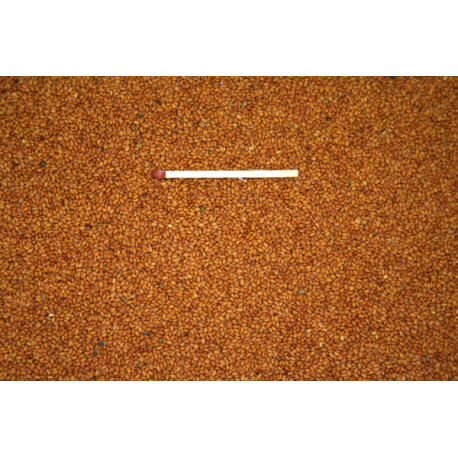- In the process of being restocked




Reference: 169103-1KG
Camelina seeds contain vitamins (vitamin E) and minerals (magnesium, zinc) that contribute to the proper functioning of the body and the maintenance of health.
They're rich in omega-3 fatty acids, healthy fats that support heart health, reduce inflammation, and promote healthy brain function.
Camelina seeds contain vitamins (vitamin E) and minerals (magnesium, zinc) that contribute to the proper functioning of the body and the maintenance of health.
They're rich in omega-3 fatty acids, healthy fats that support heart health, reduce inflammation, and promote healthy brain function.
Turnip is almost similar to rapeseed, the difference is the more bitter flavor of the latter. Turnip seed is rich in protein and favourable to the improvement of song, so it is interesting during the breeding season in canaries.
A type of seed with a mild taste and high protein content. They are also high in fat.
This seed is quite fatty, we advise you not to exceed 10% of your shuttle mix for colored canaries or posture canaries.
For singing canaries, the shuttle softens the song and can therefore be used at 30% of the mixture: in the latter case, we advise you to accompany your bird's diet with liver support.
Flaxseed is rich in omega 3, which is essential for the cardiovascular system.
The canary seed is a grass, an annual plant up to 1m tall, the seeds being found in the inflorescences. These seeds make up a significant fraction of the majority of bird mixes.
• Excellent for canaries, European and exotic birds, wavy parakeets and large parakeets.
Properties of Pine or Larix seeds.
Anti-inflammatory, analgesic, antispasmodic,
Antiseptic, anti-infectious (pneumococci),
Decongestant of the small pelvis and prostate,
Diuretic
Expectorant, tonic for the respiratory organs.
Buckwheat is a nutritious seed often included in the diet of cage and aviary birds.
- Appearance: Buckwheat is a triangular seed, light brown to greyish in colour, with a slightly rough shell.
Benefits for Birds:
- Balanced Nutrition: Buckwheat offers a combination of proteins, carbohydrates, and fibres, contributing to a balanced diet.
- Energy: The complex carbohydrates provide a sustainable source of energy for the birds' daily activities.
- Digestive System: The fibres promote good digestion and a healthy intestinal regulation.
- Proteins: The proteins in buckwheat support growth, reproduction, and the maintenance of muscle mass in birds.
This seed from switchgrass is rich in protein (12.6%) it also contains 60% carbohydrates and less than 5% fat.
It is the richest variety of millet in protein. Japanese millet is recommended to all breeders of exotics, natives, parakeets, large parakeets.
Soybeans are an excellent source of iron, zinc, manganese, copper, selenium, potassium, vitamins, fiber, polyunsaturated fatty acids and antioxidants, in short, it is an excellent dietary supplement.
Soybeans are often used in sprouting seed mixes.
Millet is used in the diet of all birds: straight beaks and hooked beaks. In bunches, it's a treat they love.
Cluster millet has a good protein and carbohydrate content and also contains a large number of amino acids. Ideal for distracting your birds and thus avoiding pecking (feather pulling).
We advised giving red millet for exotic birds. It is richer in protein than yellow millet.
Clover stimulates the immune system and slows down cellular ageing through its excellent antioxidant properties. Rich in vitamins B, C, E and provitamin A.
Peeled sunflower seeds are suitable for your budgies and parrots but also for straight beaks that live in outdoor aviaries in winter.
Sunflower seed contains almost 40% fat, but also proteins, carbohydrates, vitamins B and E. We quantify on a sunflower seed nearly 600 Kcalories per 100 g.
It satisfies throughout the year, the needs of a wide variety of birds, including the smallest of them.
Sunflower seeds are a real treat for our birds who love them!
No waste, no waste! The garden stays clean!

Camelina seeds contain vitamins (vitamin E) and minerals (magnesium, zinc) that contribute to the proper functioning of the body and the maintenance of health.
They're rich in omega-3 fatty acids, healthy fats that support heart health, reduce inflammation, and promote healthy brain function.
